It’s About More Than Cell Phone Records, It’s About Liberty
The NSA's data mining project is about more than just subpoenas for cell phone records.
James Joyner has already written today about the revelation, first broken by Glenn Greenwald at The Guardian, that the National Security Agency had been granted a Court Order requiring Verizon to turn over phone records for millions of its customers. In the hours since the story broke, the reactions have fallen into two basic categories. On the one side there is a somewhat surprisingly bipartisan group of liberals and conservatives who are expressing outrage at the entire idea that the Federal Government is scooping up vast amounts data about millions of Americans without having anything approaching even reasonable suspicion, never mind probable cause, that the data that they were requesting held any evidence of wrongdoing by those Americans. On the other side of the equation are people like Congressman Mike Rogers and Senator Diane Feinstein, both Chairs of the Intelligence Committees in the House and Senate who both said today that what was done in this case was both perfectly legal and necessary for the security of the United States. On the legality question, of course, they are entirely correct. The warrants that were used to obtain this data are authorized by the PATRIOT Act, which was passed overwhelmingly by Congress in the wake of the September 11th attacks, and the FISA Court that authorized the warrants has been in existence for decades now. As for the claims that this kind of data mining is necessary for the security of the United States, well that’s really a matter of opinion. Given that the Federal Government is never going to share with the public the classified information that would support that kind of claim, it’s left to the choice of each citizen to decide whether or not to believe the assurances of our political leaders when it comes to something that constitutes such a clear violation of individual privacy while simultaneously at least walking a fine line when it comes to the Fourth Amendment.
The first thing that ought to be made emphatically clear about the report that came out yesterday is that there is absolutely nothing new about it. As Kevin Drum notes, it’s something that has been going on for more than a decade now. Indeed, there have been other occasions in the past when reports similar to this about the amount of data being collected by law enforcement and intelligence agencies pursuant to the authority granted to them under the PATRIOT Act, which has been renewed more than once since its initial passage, including during the Obama Administration. As Orin Kerr noted over at The Volokh Conspiracy, this is all perfectly legal, a sentiment that his co-blogger Stewart Baker agrees with. However, legality is only part of the question here, it’s long past time to use a story like this for the American people to ask themselves just how much of their privacy and liberty they are willing to give up:
How is it tolerated by the American people?
That’s the most pressing question. The civic negligence required to reach this point is the thing that most disappoints me about my fellow citizens, who ought to throw out every last member of Congress complicit in the metastasizing surveillance state. I am serious. Look up your representative. In a letter or phone call, demand they take a stand against this, on penalty of you voting against them in a primary or general.
That’s how change happens when the president who promised it turns out to have lied.
We don’t know if the federal government has a similar order for AT&T or any other carrier. Or if they’re spying on Americans’ emails as well. Why? That isn’t the sort of thing President Obama thinks he needs to tell us, and Congress persists in giving him that latitude. Americans, who haven’t been objecting to any of this in large numbers, aren’t even demanding to know whether or not their government is assembling the most sophisticated surveillance state in human history.
Has fear of terrorism done this to us?
Apathy?
Denial?
Whatever the cause, the current behavior of the American electorate does not befit a free people.
Part of the explanation, I think, can be traced back to the initial shock of the September 11th attacks and the way in which subsequent government warnings about possible terrorist attacks that were a regular part of the news cycle for years thereafter. Faced with that kind of barrage, it’s perhaps not surprising that the American people largely looked the other way as the powers of the Federal Government were enhanced significantly and, more importantly, those powers were used for far more than just investigating terrorism cases. Even today, most polls seem to suggest that the public still tends to support these measures. The question that these new revelations leaves us with, of course, is whether these new revelations about Verizon being forced to share customer data (and you can rest assured that there are other orders out there that apply to all the other cell phone and landline companies as well) will cause the American people to rethink their support for these measures going forward.
Well, if the opinion makers are any indication, then we may be on the verge of a change from the course that has been in place since September 11th, 2001. Consider this from The New York Times Editorial Board:
Within hours of the disclosure that the federal authorities routinely collect data on phone calls Americans make, regardless of whether they have any bearing on a counterterrorism investigation, the Obama administration issued the same platitude it has offered every time President Obama has been caught overreaching in the use of his powers: Terrorists are a real menace and you should just trust us to deal with them because we have internal mechanisms (that we are not going to tell you about) to make sure we do not violate your rights.
Those reassurances have never been persuasive — whether on secret warrants to scoop up a news agency’s phone records or secret orders to kill an American suspected of terrorism — especially coming from a president who once promised transparency and accountability.
The administration has now lost all credibility on this issue. Mr. Obama is proving the truism that the executive will use any power it is given and very likely abuse it. That is one reason we have long argued that the Patriot Act, enacted in the heat of fear after the 9/11 attacks by members of Congress who mostly had not even read it, was reckless in its assignment of unnecessary and overbroad surveillance powers.
Based on an article in The Guardian published Wednesday night, we now know the Federal Bureau of Investigation and the National Security Agency used the Patriot Act to obtain a secret warrant to compel Verizon’s business services division to turn over data on every single call that went through its system. We know that this particular order was a routine extension of surveillance that has been going on for years, and it seems very likely that it extends beyond Verizon’s business division. There is every reason to believe the federal government has been collecting every bit of information about every American’s phone calls except the words actually exchanged in those calls.
(…)
The defense of this practice offered by Senator Dianne Feinstein of California, who as chairman of the Senate Intelligence Committee is supposed to be preventing this sort of overreaching, was absurd. She said today that the authorities need this information in case someone might become a terrorist in the future. Senator Saxby Chambliss of Georgia, the vice chairman of the committee, said the surveillance has “proved meritorious, because we have gathered significant information on bad guys and only on bad guys over the years.”
But what assurance do we have of that, especially since Ms. Feinstein went on to say that she actually did not know how the data being collected was used?
The senior administration official quoted in The Times said the executive branch internally reviews surveillance programs to ensure that they “comply with the Constitution and laws of the United States and appropriately protect privacy and civil liberties.”
That’s no longer good enough. Mr. Obama clearly had no intention of revealing this eavesdropping, just as he would not have acknowledged the killing of Anwar al-Awlaki, an American citizen, had it not been reported in the press. Even then, it took him more than a year and a half to acknowledge the killing, and he is still keeping secret the protocol by which he makes such decisions.
We are not questioning the legality under the Patriot Act of the court order disclosed by The Guardian. But we strongly object to using that power in this manner. It is the very sort of thing against which Mr. Obama once railed, when he said in 2007 that the Bush administration’s surveillance policy “puts forward a false choice between the liberties we cherish and the security we provide.”
That Obama, of course, largely disappeared once he took the Oath Of Office. Over the past four years he has largely continued the policies of the Bush Administration in a number of areas that implicate civil liberties, such as warrantless wiretapping and, as we’ve now learned, data mining, while vastly expanding in others via his Drone War and the entire idea of targeted assassinations. Programs like this are of a piece with the Justice Department’s aggressive pursuit of leaks to the point where blanket subpoeans are being served on news organizations in the name of “national security,” and they are a sign of just how much the National Security State has expended in the years since September 11th.
We’ll be told, no doubt, that all of this is necessary to keep the nation safe, but one has to wonder if we’ve given up far too much already and that there’s a danger that we’ll be giving up even more if we allow it to go any further. It’s an argument that remind me of a quote attributed to Benjamin Franklin that says “those who would give up Essential Liberty to purchase a little Temporary Safety, deserve neither Liberty nor Safety.” Yes, it’s important to keep the nation safe, but one has to ask at what cost that safety will be purchased or, indeed, if the measures that the state is telling us are necessary will actually do anything to keep us safe. At this point, the burden ought to be on the government to justify not only any further encroachments on personal liberty, but also those that have already taken place. The PATRIOT Act will turn twelve years old in October. It has been renewed several times over those years. Perhaps now is the time to reconsider the amount of power we’ve granted to the government in the wake of an extraordinary and tragic event, because if we don’t take it back at some point it will never go away.
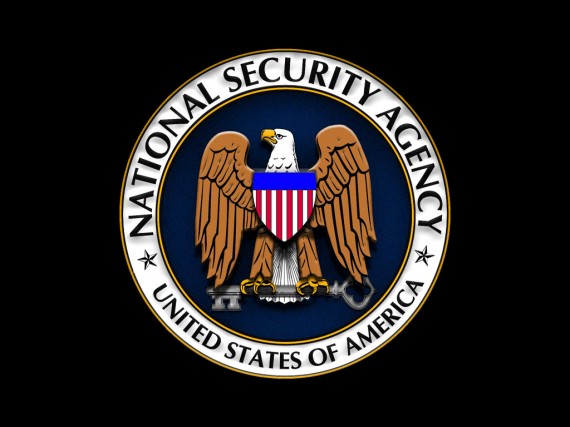

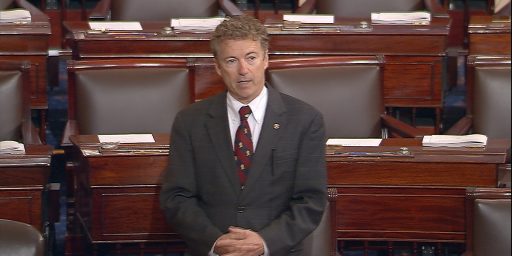
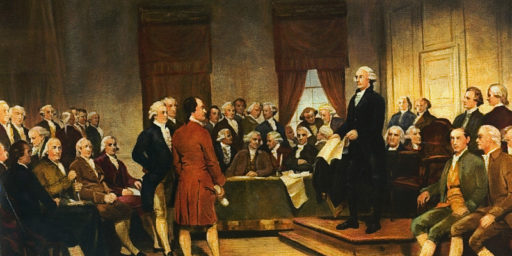
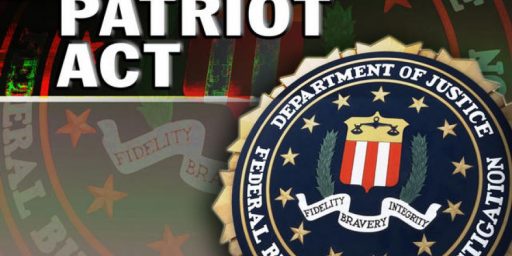
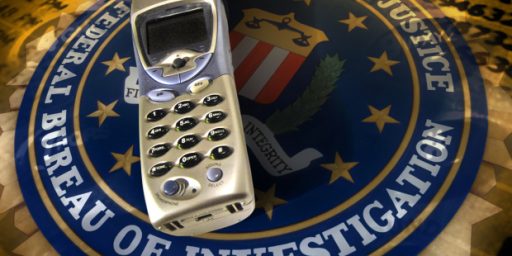

It’s not just phone calls.
My comment is caught in the spam filter.
The bipartisanship of both sides is pretty striking. For example, the WSJ just rose to the defense of the policy — if not the administration — http://online.wsj.com/article/SB10001424127887324299104578529373994191586.html?mod=rss_opinion_main
From a purely political perspective, this presents the greatest irony. The “scandal” that could arguably do the most damage to the Obama administration is the one that the GOP, as a whole. are the least well positioned to take advantage of.
@DC Loser:
Liberated
So, basically the NSA is no better than the Stasi.
Doug, I’m not sure I agree with you on the legality. It was my understanding, via the EFF, that the Patriot Act granted this kinds of surveillance power for potential terrorism but did not grant this kind of sweeping dragnet of surveillance of everyone (and, as we’re finding out today, it’s everyone).
Sorry, but everytime I go through airport security I become convinced the American people are sheep.
So George Orwell was off by 29 years.
I’m surprised everyone is surprised.
Americans _wanted_ this. They wanted to be sure no scary Mooslims blew them up, so they had no problem surrendering liberty for (the illusion of) security. We had already ceded the moral high ground by embracing torture and invading a country that had nothing to do with 9/11, so what’s a little data mining among citizens?
Everyone mounted on high horses over this, they’re prepared to cut Obama slack for not fighting terrorism with every weapon available, correct? And if an attack that might’ve been prevented with data mining slips through, that’s just the price Americans are willing to pay for their freedom, correct? The answers you’ll get from our countrymen, of course, are “No” and “No.”
People, what did we expect?
I distinctly remember when Bush was in office all these issues came up, liberals were outraged, and conservatives called us terrorists and made snarky statements like “if you have nothing to hide, this won’t affect you at all”.
Now that Obama is in office and using the laws that conservatives rammed through under the guise of patriotism and security, those same conservatives leak this info timed to pile on the other “scandals” to try to weaken Obama.
Forgive me if my reaction is basically you reap what you sow. Unless Congress is willing to repeal the Patriot Act and FISA, this is all just more conservative deflection couple more weeks of feigned outrage by the usual disingenuous subjects (Greenwald, Fox News, etc.).
@DC Loser: been there, after posting a link to a webpage. i just use another email to comment with.
@Gold Star for Robot Boy:
We’ve become a nation of cowards
@Ben:
From the comments of that WSJ story:
I find I can’t generate much outrage. I think we surrendered privacy when we adopted the Internet. As a practical matter does PRISM change my life? How? How is it so specifically awful that the government knows about me what Google knows about me? Don’t get me wrong: I enjoy being outraged. But what specifically, practically is changed?
Privacy is not the natural condition of man, it’s a relatively recent innovation. In the cave and the camp and the village privacy would be unknown. Privacy is a brief, modern reality in wealthy countries.
So yes, the NSA may have listened in on the Skype I did with kids in South Carolina. So? Someone explain to me – without hoary slippery slope arguments or dystopian fantasy – why I should be upset.
Honest question, I’m not trolling.
The real problem here is whether or not the law allows for domestic monitoring. This was the same question that came up during all the screaming, yelling and gnashing of teeth during Bush 43.
The main author of the Patriot Act, Jim Sensenbrenner, says it doesn’t allow for domestic monitoring.
And these are FISA courts (Foreign Intelligence Surveillance Act) issuing the warrants. Foreign, Foreign !!!
We were assured during the last administration that at least on party on these communications were foreign.
The only thing that is “foreign” about PRISM appears to be in the name of the court that issued the warrant.
@Neo:
Sensenbrenner can say what he wants, but as he’s the man who wrote the PATRIOT Act to begin, I’m not inclined to help Dr. Frankenstein go wrestle with his monster.
@Matt Bernius:
Is this the same WSJ that just two days ago denounced the bike share program in NYC as the most abhorrent totalitarianism and threat to our historic liberties?
So: data mining all Americans’ communications? Okey-dokey.
Providing free bikes to ride around New York? Tyranny! Wolverines!
OK then.
@michael reynolds:
I think you dismiss the slippery slope argument too easily, and I say that as someone who usually detests it. Here are a few reasons for outrage:
1. Inevitably, the government will use this info to pressure someone into pleading guilty to a lesser crime that he did not commit in order to avoid facing a sentence for a much greater crime. The odds of this happening to any one person are extremely low, but that person is a proxy for all the rest of us. We should protect his right not to be unduly prosecuted in order to protect our own.
2. The government is going to investigate some people based on this info. Almost all of those people will be completely innocent, but some of them may have talked to neighbors or co-workers about Israel’s occupation of Palestine or U.S. military mistreatment of Muslims or something else controversial. Some of those people will stop speaking out against these things once they learn of the govt’s investigation. The existence of an all-powerful surveillance state can only lead to the suppression of the speech of those who may be, for a variety of reasons, unwilling to subject themselves to the slightest bit of pressure. I think that’s very bad and I believe, based on your past defenses of the 1st Amendment, that you would find it completely unacceptable.
3. While privacy is a relatively modern convention, I don’t think it’s an accident that its development coincides with an expansion of other personal liberties such as greater acceptance of LGBTs and atheists/agnostics, greater rights for children, etc. I’m not arguing that privacy is the cause of these other developments, but I do believe they each feed off one another. I don’t think we can expect a continued expansion of these and other personal liberties at the same time we’re undermining privacy.
@ Rafer Janders
Damn hippie bike lover!
@Ed in NJ: The difference was that Bush plan was to monitor communications looking for those where at least one party was “foreign.” The rest were discarded.
PRISM makes no such distinction. PRISM is domestic monitoring, with foreign thrown in to boot.
@Spartacus:
Thanks for that. I’d like to address it tomorrow when I’m more alert. Just got home from a rather dull awards ceremony that wasn’t even for me. (Hmm, maybe that’s why it was so dull.)
The founding fathers would laugh. We knowingly as a majority are okay with allowing our government to spy on us, yet we refuse to agree to background checks for purchasing a firearm. US citizens will allow the government to do whatever as long as it is sold as patriotism.
Michael, as my dad would say, “It’s the principle of it.”
RC
For an interesting case on how the government operates completely outside the Constitution, look up Kecksburg incident. In this occurrence the government came in, took over, gave illegal orders, pushed the people around, seized property illegally, and developed a phony story that it made the press put out. The lesson there was if some sort of unusual incident occurrs, do not call the police or military. Call in every news media that can be found so that nothing can be covered up.
@Ed in NJ:
]
If you be nice if you could provide links that supports anything you say. It is amazing that somehow the Guardian newspaper in the U.K. is an organ of the U.S. Republican Party.
Is there no limit that progressives will go to to carry water for the Obama Administration. Is the next step to play the race card again?
Either progressives were serious in their opposition to the actions and policy or the Bush II Administration or it was all for show and they did not really care. Image how bad the violation of rights will be in the coming one party state.
@Matt Bernius: “The “scandal” that could arguably do the most damage to the Obama administration is the one that the GOP, as a whole. are the least well positioned to take advantage of. ”
Because they support the policy, and their only complaint would be not doing more of it.
@Spartacus: In addition, this data will be available to more and more agencies, in a more and more convenient format. Half of my fear is that I’m sure by now that pulling an incredibly complete and useful dossier is now a matter of 30 seconds and a few mouse clicks; even the most routine interaction could justify pulling this.
By now, it’s more and more likely that more and more government agencies can and will pull your ‘profile’ on a casual basis.
@Neo:
Just for the record, Sensenbrenner *introduced* the Patriot Act. The actual main author of it was Assistant Attorney General of the United States Viet Dinh — https://en.wikipedia.org/wiki/Viet_Dinh
It’s common for the congress person who introduces an act to take responsibility for its authorship. However, when it comes a law this complex, I think it’s a little disingenuous for someone like Sensenbrenner to claim an author’s authority to say what the law is “meant to say.”
@michael reynolds:
So in the cave and the camp and the village, where those good places and times for freedom? If you wanted to live your life your own way, and not conform to what everyone else was doing, were those the best places for it?
No, of course not. Most of our conception of and exercise of rights and civil liberties came about as we moved away from those small communities and into cities, as we expanded the realm of privacy. Freedom of speech, freedom of religion, the right to bodily integrity, defeating slavery, women’s rights, gay rights, etc. etc. all ran on track with more privacy.
So, yeah, we can destroy privacy. But I don’t think we’ll like the end result when the powers in charge decide they don’t like our little experiments in living our lives the way we want to…..
No, it is about the security and safety of our country and citizens. One person’s liberty is another’s freedom. Just look at slavery and civil rights history in our country. Liberty without security does not exist.
Some people want it both ways! They want their ‘liberty’ but also want the government to protect them! If the government tracks cell phones, Facebook, etc. etc. to see if anyone is plotting to cause mayhem to fellow citizens across the country, I personally have no problem with that. Liberty isn’t a lot of good to anyone if the government had chosen not to use those methods to see who is talking to who and what they are planning ends up killing thousands of people! So people can rant on about liberty all they want. I’d sooner be alive and let the government do what they have to do to keep me that way.
How is that exactly? I think you are conflating the act…free speech…with the forum…phones.
Phones and the intertubes are a public forum…accept it. If you are willing to stand in Times Square and say something…then go ahead and say it on your phone. But if not…then you shouldn’t.
Reynolds is right…private companies (Google) are collecting more info about you than the Government is. Where’s the outrage?
You want privacy? Don’t use your cell phone. Simple.
@Barry:
I think this is a really key point. The amount of effort previously required to amass and format this much information acted as a natural impediment to governmental overreach. Now that it is very easy to do, its use will become pervasive, which is the same problem I have with the use of drones. By lowering the cost of killing and spying on people, we increase the demand for those things.
@Spartacus: @Rafer Janders:
I continued this at a newer thread.